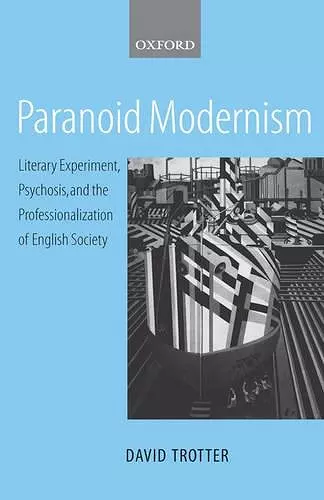Paranoid Modernism
Literary Experiment, Psychosis, and the Professionalization of English Society
Format:Hardback
Publisher:Oxford University Press
Published:27th Sep '01
Currently unavailable, and unfortunately no date known when it will be back

The early twentieth century notoriously saw an unprecedented wave of experiment in the arts. So intense was this activity that one can without exaggeration speak of a will to experiment (to 'make it new'). Where did that will to experiment come from? Why did it so insistently take the forms it took? Looking specifically at Modernism in England, David Trotter seeks answers in the careers of three novelists writing in the first decades of the century: Ford Madox Ford, D. H. Lawrence, and Wyndham Lewis. The context he proposes for their work is that of contemporary understandings of the function and value of expertise, and of the dilemmas peculiar to those possessing it. There is a certain madness about the expert's pursuit of expertise, and about his or her disappointment if expertise fails to yield adequate social recognition. The early psychiatric literature identified this madness as paranoia, and the textbooks and case-histories find an uncanny echo in Modernist fiction. In the obstinacy of their will to experiment, Ford, Lawrence, and Lewis wrote about, and lived, paranoia. To understand that obstinacy in its professional and psychiatric contexts is to approach from a new and unexpected angle the preoccupations with gender and with the politics of culture which currently characterize the study of Modernism. The energies it shook loose in their writing are energies which, evading absorption into the 'postmodern', continue to shape Western society and culture to this day.
... important study ... The sheer sweep of [Trotter's] study is impressive ... His analyses are never less than illuminating ... Trotter's interpretations are invariably stimulating. * English Literature in Transition 1880-1920 *
This is a significant study of modernism that is likely to change the way readers look, not just at modern literature, but at literature and art generally. It demonstrates beyond question that paranoia and literature have much in common. * English Literature in Transition 1880-1920 *
Trotter has a complicated story to tell, but he tells it with admirable lucidity ... erudite and exhilarating. * Adam Phillips, London Review of Books *
ISBN: 9780198187554
Dimensions: 224mm x 146mm x 25mm
Weight: 544g
368 pages